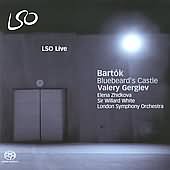There have been about a dozen recordings of Bluebeard’s Castle; it is ideally suited to the medium. Every production of it I have seen has no alternative other than to be as obedient as possible to Bartók’s directions; indeed, his tone painting is what this opera is about. His jewels sparkle brilliantly, his water undulates and ripples, blood shows up everywhere; these things happen whether you’re watching it or not. And if they don’t, you may kill the conductor.
In this new, live recording from the Barbican in January, 2009, the ubiquitous Valery Gergiev’s life is safe. His tempos seem vaguely rushed at times, but a comparison with other recordings, even subtracting the one-minute spoken prologue (here rendered in English–an odd choice and one that sounds particularly wrong when the singing begins in wonderfully jagged Hungarian), puts him at 58 minutes (Kertesz is 90 seconds slower; Sawallisch is the same; Solti is a minute faster; Adam Fischer is three minutes slower), which is average and hardly eccentric.
The LSO plays beautifully. The brass, when needed, can be ravishingly mellow and cushioning, as just after the armoury door is opened and Judith is declaring her love for Bluebeard; later, they terrify with their ferocity–and respond to all of Bartók’s changing colors. And the singing is top-notch (more about that in a moment).
But something is amiss; the opera does not have the effect it does when we hear a great performance. The jewels shine properly, Judith’s tremble at the sight of the armoury is vivid, the horns cast a blue-green light as the gardens are exposed at the fourth door, the vast domain sounds suitably vast at the C major fifth door, and the aforementioned nauseating burble of water at the lake of tears has an appropriately spine-chilling effect. But that’s Bartók.
What an understanding, probing conductor lends, offers, demands is either neurotic, jittery tension (Kertesz); a tragic Romanticism (Fischer, with Ramey and Marton at their best); and/or creepily concentrated and surprising colors (Haitink, though with a weak Otter as Judith). Gergiev probes not; he leads a performance that forgets its excitement, sadness, and drama until three minutes before the seventh door is opened. Until then it is a quite beautiful tone poem, a scrutinizing of sound effects and orchestration: the moments leading up to the soft, sad coda are staggering.
Elena Zhidkova, a mezzo new to me, has a wobbly moment or two near the start but is otherwise wonderful. Perhaps her fear is not as palpable as Christa Ludwig’s (Kertesz), and she may not sing as beautifully as Jessye Norman (with Boulez, who occasionally disconnects emotionally and sounds like an enthusiastic real estate agent), but she’s utterly believable–arrogant, unreasonable, and eventually, self-knowing. Willard White, now 63, has lost none of his power and comes close to embodying both the sadness and the terror in the role. (Ramey’s voice is more beautiful.) Correctly, Bluebeard is the more sympathetic of the two.
Newcomers will not notice anything wrong with this performance, but those of us who know and love the opera will stick to Kertesz (Decca) or Fischer (Sony) for its full emotional, as well as musical, impact.
































